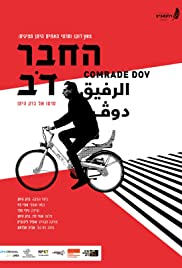
COMRADE DOV
Israel, 2019, 75 minutes, Colour.
Directed by Barak Heymann, Uri Levi.
This is a film of particular interest to Israeli and Palestinian audiences. However, for audiences worldwide, it raises many of the issues in the history of Israel, life in the Gaza Strip, in the conflict between Palestinians and Israelis, the dialogue between Arabs and Jews.
The brief documentary focuses on a significant politician, Dov Khenin, from Tel Aviv, from an affluent family, Ashkenazi tradition, one-time Communist, all-time Socialist, member of the Israeli Knesset for 13 years.
Directed Barak Heymann, a journalist in the early 2000’s, began his interviews with Dov, recording and filming. Taken by the personality as well as Dov’s political views and commitment, Heymann continued to film him over the years. This is a portrait of the man, often in close-up, genial, always open to dialogue, fiercely committed to his beliefs and courses.
He was elected to the Knesset representing the Jewish- Arab party. With his strong belief in socialism, he is also a believer in peace negotiations, war being a lose-lose situation. He has brought these convictions to his work in the Knesset, seen making a number of speeches, and at the end listing pieces of legislation to which he contributed. There are also very rowdy scenes of the meetings of the finance committee of the Knesset, his interventions, arguments, being shouted down, voted against, ousted. Yet, at the end of his period, he makes a speech in the Knesset, fellow-members listen and he is applauded as he leaves Parliament.
Dov is always very strong in being present at protests and demonstrations, joining with Arabs, speaking Arabic, sympathetic to causes, issues of the settlements (and seen in discussions with young people, especially from the settlements who see the Arabs as perpetual enemies and killers), the destruction by demolition of the Arab village set up in 1956 but to be transformed into a Jewish settlement. There are many sequences of protests and marches.
There are some personal interviews, a sympathetic interviewer voicing anti-Arab views and Dov responding, accusing the interviewer of ignorance and trying to put balanced viewpoints for television audiences – Dov then being asked about his ancestry, the influence of his parents and grandparents, their social concerns, interventions, and even to his being member of a singing group, and his attempt at a song.
Dov is strong on the advocating of a two state land, which means that he has fierce opponents, many sympathetic listeners, and the film questions a lot of the Israeli behaviour since 1948, and, while provoking opponents, still hope for peace, dialogue between Arabs and Jews.